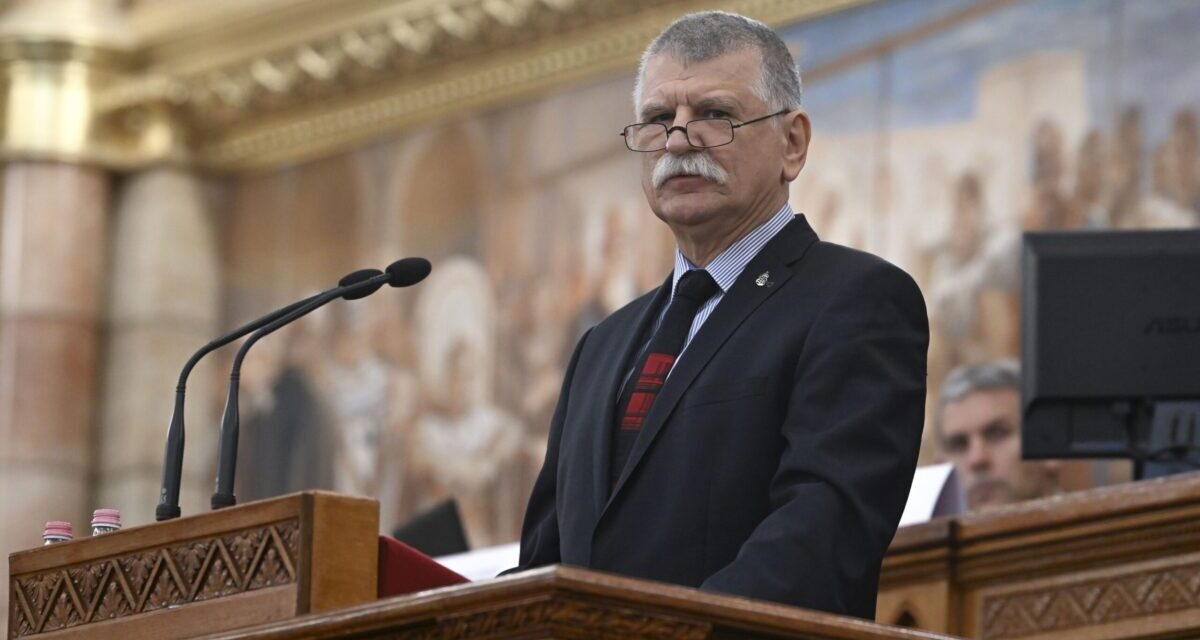The wrong policy of the Brussels leadership endangers the existence of the European Union.
The erroneous migration policy of the leadership of the European Union (EU) results in social destabilization in Western Europe, which, combined with the effects of the economic destabilization of the EU, may endanger the existence of the European Union as an organization, said László Kövér at the 72nd plenary meeting of COSAC in Budapest on Monday.
The President of the National Assembly emphasized to the delegations of the committees dealing with European Union affairs of the national parliaments of the member states:
today, the most important task of all responsible European politicians who love and serve their country and Europe is to avert this danger, to preserve the European Union as the community of values and interests that its founders created.
László Kövér, referring to the meeting organized during the Hungarian EU presidency in 2011, pointed out that in the past thirteen years, a series of crises has hit Europe and the world: illegal migration, a pandemic and a regional armed conflict threatening a world war on European soil.
These brought with them the danger that the European Union would turn from a plan of peace, democracy and prosperity into a reality of war, dictatorship and impoverishment, he added.
He explained: as a result of the wrong Brussels sanctions policy, the European Union's GDP rose by 0.2 percent last year, while Russia's GDP rose by 3.6 percent. Due to the wrong economic policy of the EU leadership, the share of the EU in the world's GDP is decreasing every year. In the EU, the price of electricity is 2-3 times higher and the price of natural gas 4-5 times higher than in the United States. This leads to a serious competitive disadvantage for European industry, he concluded.
The President of the Parliament - who interpreted the greeting of Prime Minister Viktor Orbán, who was traveling abroad for the official program - emphasized: Hungary took over the presidency in times of extraordinary circumstances and challenges.
He pointed out: our continent and the European Union are being seriously tested by the war taking place in our neighborhood, illegal migration, demographic trends, the fragile security situation, the vulnerability of international supply chains, the separation from global competitors, as well as the effects of climate change and natural disasters. .
We are confident that under the Hungarian presidency we will be able to get closer to finding suitable common answers to these challenges, he said.
He recalled: on December 1, it will be 15 years since the Treaty of Lisbon entered into force. Among the reforms introduced by the treaty, he highlighted the strengthening of the role of national parliaments in the decision-making processes of the European Union. According to his assessment, this does not serve its purpose, primarily because of the committee's illegitimate policy of taking away the powers of the member states.
He also explained that in connection with the Minority Safe Pack, a valid citizens' initiative called "One million signatures for the diversity of Europe" and also supported by the European Parliament, the European Commission did not consider it necessary to present a legislative proposal in any of the proposed and elaborated measures, despite that it is about the demand for equality of rights of more than 40 million Europeans living in a national minority situation - not least European voters and taxpayers.
László Kövér expressed his hope that the attitude of the newly established European Commission will change in the future and that it will exercise its powers not arbitrarily, but in accordance with the EU treaties, "although there are no signs of this," he noted.
He also said that demographic changes have a profound impact not only on the EU's economy, welfare systems, growth, resilience and competitiveness, but also on the long-term chances of the survival of European civilization as a whole.
He pointed out: dealing with demographic issues is basically the responsibility of the member states, however, in order to stop the decline and continuous aging of the EU's population, we must also deal with these issues at the EU level. The solution is not to encourage migration, but to support the desire of European families to have children, he emphasized.
He also touched on the following: Hungary pays special attention to border protection, curbing illegal migration and increasing internal security, which contributes to the stability of the EU as a whole.
He stated: from the point of view of security and stability, one cannot forget the enlargement of the EU either. He emphasized that substantial progress is now needed, and a consistent and non-double-standard approach must be used with candidate and potential candidate countries. They are convinced that it is not possible to wait any longer in the Western Balkans, that the countries that are at the forefront of the negotiations, especially Serbia and Montenegro, should be included among the members as soon as possible, he stated.
He also said that Hungary considers a strong European Union based on the cooperation of strong nation-states to be a future goal. However, this is not at all contrary to finding common answers to common European challenges, but these can only be reached through open, honest, democratic debates, not by stigmatizing and excluding those with different opinions, he believed.
The President of the Parliament quoted the Christian Democrat politician Robert Schuman: "Europe brought fulfillment to humanity. He must therefore show a new way, instead of striving to subjugate others, through the recognition of the diversity of cultures, each representative of which cultures are treated with mutual respect for the others".
Hungary shows this respect to everyone and expects it from everyone, he said.
MTI
Cover photo: László Kövér, the President of the Parliament, delivers the opening speech at the meeting of the committees dealing with EU affairs of the European Union parliaments in the Upper Chamber of the Parliament on October 28, 2024.
Source: MTI/Koszticsák Szilárd













